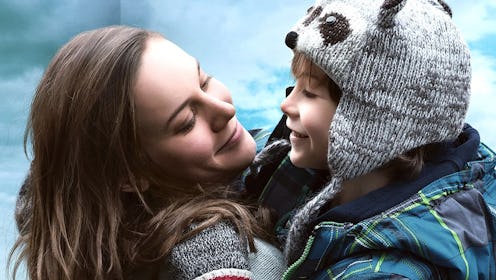Entertainment
Readers, Relax: 'Room' Stays True To The Book

When I first heard that there was going to be a film adaptation of Room, the novel by Emma Donoghue, my emotions were mixed. Part of me was nervous — the 2010 book is one of my all-time favorites, and like any impending adaptation, I didn't know if the movie would do right by its literary inspiration. Yet mostly, I was just excited — especially when I heard that the film would feature the great trio of star Brie Larson, director Lenny Abrahamson, and screenwriter Donoghue. And now that I've seen the film, I can't imagine why I was ever worried — not only is Room not different from the book in any major way, but it's just a wonderfully made movie that might be one of the best I've seen all year.
Led by the duo of the always-great Larson (Short Term 12) and the astonishing newcomer Jacob Tremblay, Room is an absolute must-see, both for readers of the book and those new to the heartbreaking story. About a mother and son trapped for years in a single room by a deranged kidnapper, the film is often difficult to watch, but absolutely worth it. Book readers, especially, will adore it, as thanks to Donoghue's work as screenwriter, it stays largely true to the novel. Still, as happens, there are a few changes the movie made to the bestseller. Relax, Room fans: this is an adaptation that takes a few liberties from its source material, but overall, is every bit as good as the book it's based on.
1. There's More "After"
Perhaps it's just because a book is obviously longer than a script, but the movie shows more of the "after" — i.e. all the time following Ma and Jack's escape. A large portion of the film is dedicated to the duo's time reuniting with their family and readjusting to the world, while in the book, those scenes don't take up nearly as much time.
2. The Grandparents Play A Bigger Role
Although Grandma and Grandpa are introduced in the novel when Ma and Jack get out, they aren't truly central characters. Yet in the film, they're included in a large portion of the "after" scenes, and have personalities more developed than their versions in the book.
3. Breastfeeding Is Barely Mentioned
In the novel, Ma breastfeeds Jack up until the time of their escape, as there's no real reason to stop since they're held captive and have little access to other food. Jack often thinks and talks about getting breastfed, and it's a big shock for him after the release that it's no longer able to happen whenever he wants. In the movie, this might also be the case, but breastfeeding, both before and after the escape, is hardly mentioned, save for a quick moment when Jack motions to his mother's chest and she tells him she's unable to breastfeed any longer.
4. There's No Independent Living Facility
When, in the book, Ma finally leaves the hospital and Jack leaves his grandparents' house, they move to an independent living facility. Yet in the movie, this doesn't happen; as soon as Ma and Jack leave the hospital, they head to the grandparents' house together, and stay there for the rest of the film (minus Ma's post-suicide attempt return to the ward).
5. Jack's Haircut Goes A Bit Differently
One scene both the book and movie share is Jack deciding to finally cut his long hair. Yet the book has him simply cutting the hair and realizing he still has his "strong," while the movie shows him sending the locks to his hospitalized Ma as a way of helping her heal.
6. Less Is Known About Nick's Fate
There is a scene in the film when Ma and Jack, in the hospital, watch a TV news station announce that Old Nick has been arrested. It's safe to assume that he'll face a long life in jail — yet in the book, you don't have to assume, because more details are provided about his likely prison sentence and the charges he faces.
7. Jack's Adjustment To The World Is Quicker
Although Jack's transition to the outside world, as shown in the movie, isn't without its speed bumps (it takes him awhile to speak up and play with toys, for instance), it happens without any real issue and it's clear he's progressing well. In the book, though, his adjustment is significantly harder, and he misses Room and his old life more than he seems to in the film.
Overall, Room is an incredibly faithful adaptation, and it'll surely satisfy audiences regardless of whether they've read Donoghue's novel (although in my opinion, everyone should read it. It's so, so good). It keeps the heart of the book alive while adding in a few impressive cinematic changes — in other words, it's everything you want a book-to-movie adaptation to be.
Images: A24; Giphy (4)